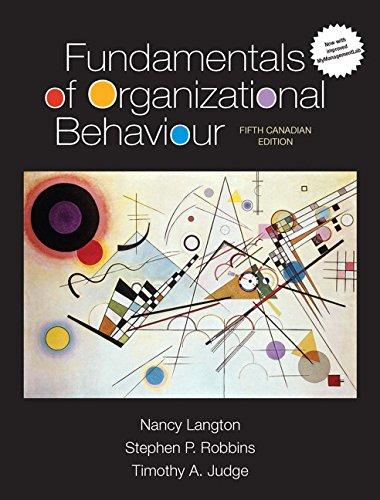Whole Foods, a fast-growing chain of upscale grocery stores with stores in Vancouver, West Vancouver, Toronto, and
Question:
Whole Foods, a fast-growing chain of upscale grocery stores with stores in Vancouver, West Vancouver, Toronto, and Oakville, a few in London, England, as well as a large number in the United States, has long been a Wall Street favourite. 1 It regularly appears on Fortune' s list of 100 Best Companies to Work For (it was #32 in 2012) and has spawned its share of competitors, including Fresh Market and Wild Oats.
Given that most industry analysts see a bright future for upscale organic markets like Whole Foods, it's no surprise they have attracted their share of investor blogs. One prominent blogger, "Rahodeb," consistently extolled the virtues of Whole Foods stock and derided Wild Oats. Rahodeb predicted Wild Oats would eventually be forced into bankruptcy and the Whole Foods stock price would grow at an annual rate of 18 percent. Rahodeb's Yahoo! Finance blog entries were widely read because he seemed to have special insights into the industry and into Whole Foods in particular.
Would it surprise you to learn that Rahodeb was exposed in 2007 as Whole Foods co-founder and CEO John Mackey? ("Rahodeb" is an anagram of "Deborah," the name of Mackey's wife.) What is more, while Rahodeb was talking down Wild Oats stock, Whole Foods was in the process of acquiring Wild Oats, and deriding the target may have made the acquisition easier and cheaper. Because the companies often have stores in the same cities, the Federal Trade Commission (FTC) attempted to block the acquisition and was responsible for "outing" Mackey. In March 2009, Whole Foods agreed to sell 31 of the Wild Oats stores it had acquired, drop use of the Wild Oats name, and undertake other actions that nullified the benefits of the acquisition.
Mackey lamented the debacle- not his secret blogging but the Wild Oats acquisition. He said, "We would be better off today if we hadn't done this deal-taking on all this debt right before the economy collapsed." By 2008, Mackey was blogging again, under his real name. His posts are neither as frequent nor as interesting as Rahodeb's.
Do you think it is unethical for a company leader like Mackey to pose as an investor, talking up his or her company's stock price while talking down his competitor's? Should leaders be judged solely on their end achievements? Or do the means they choose also reflect on their leadership qualities? Would Mackey's behaviour affect your willingness to work for or invest in Whole Foods? Is it impossible for leaders to be ethical and successful?
Step by Step Answer:

Fundamentals Of Organizational Behaviour
ISBN: 9780134204932
5th Canadian Edition
Authors: Nancy Langton, Stephen Robbins, Timothy Judge





